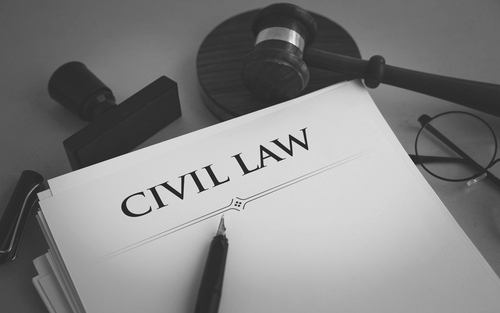Contributor: Lee Grossman
What Is a Deposition?
Civil litigation cases involve a wide variety of topics: contracts, business disputes, construction, negligence, personal injury, contested probates, family law, and more. A general rule of thumb: if the case does not involve criminal charges or juveniles, it’s probably civil litigation. Part of the civil litigation process involves gathering evidence, known as discovery. Attorneys do this by sending written questions called interrogatories, issuing subpoenas, and holding depositions.
A deposition allows attorneys to ask questions of witnesses who provide sworn testimony under oath. The witness could be one of the parties to the litigation or the witness could be a non-party who has information critical to the outcome of the case. A deposition helps all parties gather facts that support the strengths or expose the weaknesses of a case. The purpose of a deposition is to learn more information about the witness’s knowledge of the case, not make legal arguments.
A deposition is held outside the courtroom setting. This means the deposition can be held in a place convenient to the witness, the parties, the attorneys, like an office conference room. A judge and jury are not involved in this process. Instead, the parties create a transcript of the witness’s testimony through the help of a court reporting service. The court reporter can type down a verbatim transcript of the witness’s testimony, make an audio recording, or a videographer can make a video recording of the deposition. This helps preserve the witness’s statement for future use, including later at trial if a witness forgets their previous testimony or purposefully tries to change their previous testimony.
How to Prepare for the Deposition
If a witness or party is represented by an attorney or law firm, the witness should meet with their legal team before the deposition. Attorneys will help the witness prepare for the topics that will likely be covered, what questions will likely be asked, and the appropriate way to answer questions. Attorneys will review important documents with the witness so the witness is familiar with those documents before the deposition starts.
The witness should already be aware of specific information related to the case simply by being involved in what happened before the lawsuit. Keep in mind the attorney’s job is not to tell the witness the “right” answer. Instead, the witness should provide truthful answers to each question. The witness should avoid guessing or speculating on what happened because these answers could be contradicted by other witnesses in the case.
How to Act During the Deposition
Depositions are not meant to be torture, even though it may seem like it to the witness. Depositions are not a test of endurance. Attorneys will ask for frequent breaks for the convenience of the witness and the court reporter. Attorneys have a job to do: they are there to get information from the witness. Attorneys know it is not a pleasant experience for the witness and will often do what they can to make the witness feel at ease.
The witness should dress comfortably, but professionally for the witness’s type of work. The witness should bring water, snacks, medication, or anything that the witness would normally need throughout the day. Most law firms provide water, snacks, and lunch to the witnesses, court reporters, and attorneys, but not always. It is a good idea to check with legal counsel to see what will be provided.
Remember that once the witness is sworn in, everything the witness says during the deposition is being recorded unless the attorneys go “off the record.” Attorneys will normally announce when they are off the record for breaks or when the attorneys need to discuss matters with each other that are not relevant to the witness’s testimony.
After the Deposition
The witness will have an opportunity to read and review the transcript created by the court reporter after the deposition. A copy of the transcript will be delivered to the witness; it is not reviewed on the spot. If the witness notices any errors in the transcript, the witness will have the opportunity to correct the errors. The witness cannot change an answer they don’t like, but they can correct transcription errors. (E.g., the court reporter recorded the witness’s year of birth as 1978 instead of 1987.)
While the witness may have no desire to ever read the deposition transcript again, the attorneys will likely use the transcript several months after the deposition is over. The attorneys may use the transcript to support a pretrial motion. If the case goes to trial, the attorneys may show the witness a portion of the transcript if the witness cannot remember the answer to a particular question or the witness gives an answer different at trial from the answer given during the deposition.
Regardless of when a witness is testifying – at a deposition, at a pretrial hearing, or at trial – it is important for the witness to treat their testimony seriously. The witness’s goal when providing testimony is to provide honest, straightforward answers. The witness took an oath to tell the truth, not to tell a version of the truth that the witness thinks will help one side over the other. All attorneys want from a witness, and all attorneys are entitled to receive from a witness, are truthful answers. It is part of an attorney’s job to analyze all the facts, including the witness’s testimony, and provide legal advice to the attorney’s client. Deposition testimony is part of this crucial analysis.
Conclusion
The legal professionals at SW&L Attorneys can help you through difficult legal problems, litigation, and more. If you need to consult with an attorney about civil litigation, please contact us.










